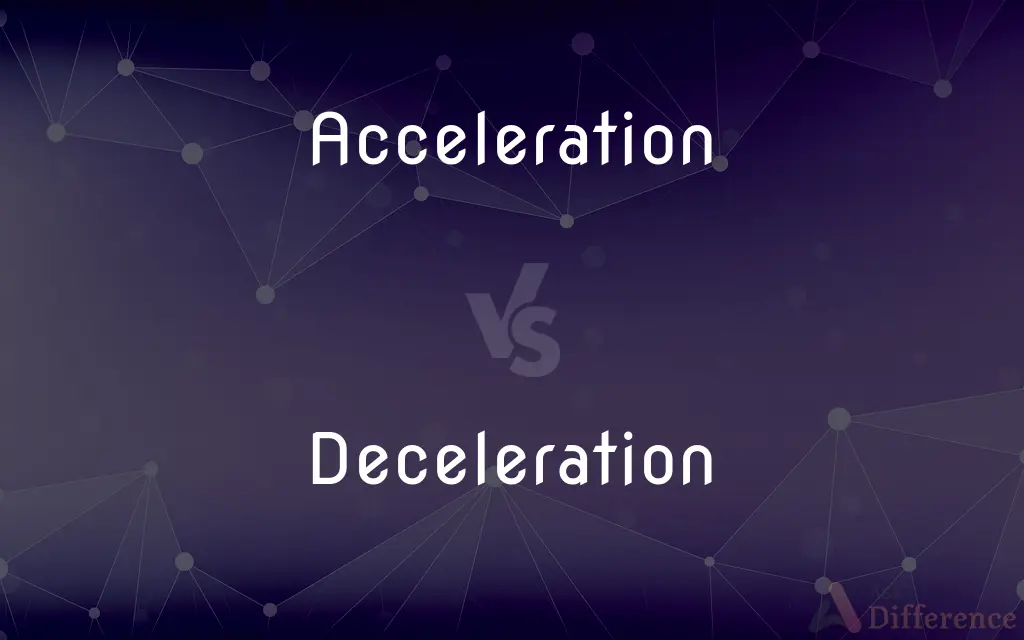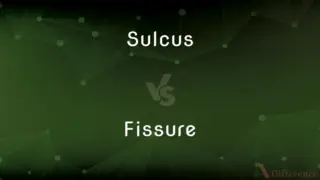Acceleration vs. Deceleration — What's the Difference?
By Tayyaba Rehman & Maham Liaqat — Updated on March 14, 2024
Acceleration refers to an increase in velocity, while deceleration indicates a decrease.

Difference Between Acceleration and Deceleration
Table of Contents
ADVERTISEMENT
Key Differences
Acceleration is the rate at which an object's velocity changes over time, typically measured in meters per second squared (m/s²) in the context of physics. It signifies an increase in speed or a change in direction. Whereas, deceleration specifically refers to the reduction in speed, highlighting a negative acceleration where velocity decreases over time.
Acceleration can be caused by various factors, such as gravitational force or applied forces like pushing a car. On the other hand, deceleration can result from natural forces like friction or resistance, or by intentional actions such as applying brakes in a vehicle.
Acceleration often connotes a positive change, such as speeding up or moving forward more quickly. Deceleration, conversely, tends to have a negative connotation, associated with slowing down or reducing speed.
The calculation of acceleration involves changes in velocity and the time over which those changes occur. Deceleration calculations, while technically the same, are distinguished by a negative acceleration value, indicating a decrease in velocity over time.
Understanding acceleration and deceleration is crucial in fields like automotive design, where safety and performance depend on the precise control of vehicle speed. Deceleration is particularly significant in designing braking systems and safety mechanisms to ensure timely and controlled stopping.
ADVERTISEMENT
Comparison Chart
Definition
Increase in velocity
Decrease in velocity
Measurement Unit
Meters per second squared (m/s²)
Meters per second squared (m/s²)
Connotation
Positive change in speed
Negative change in speed
Causes
Gravitational force, applied forces
Friction, braking
Application
Speeding up, changing direction
Slowing down, stopping
Compare with Definitions
Acceleration
Change in Direction.
The athlete's sudden acceleration in a new direction caught the defender off guard.
Deceleration
Safety Mechanism.
Emergency braking systems are designed to maximize deceleration without loss of control.
Acceleration
Physics Term.
Acceleration is a vector quantity, meaning it has both magnitude and direction.
Deceleration
Slowing Down.
Deceleration is necessary when approaching a red traffic light.
Acceleration
Positive Acceleration.
Positive acceleration indicates the object is speeding up.
Deceleration
Negative Acceleration.
Deceleration is considered negative acceleration since it reduces velocity.
Acceleration
Acceleration Force.
The rocket's engines provide the acceleration needed to escape Earth's gravity.
Deceleration
Controlled Stopping.
The train's deceleration was smooth as it approached the station.
Acceleration
Increase in Speed.
The car's acceleration was evident as it merged onto the highway.
Deceleration
Reduction in Speed.
The driver applied the brakes, initiating deceleration.
Acceleration
In mechanics, acceleration is the rate of change of the velocity of an object with respect to time. Accelerations are vector quantities (in that they have magnitude and direction).
Deceleration
To decrease the velocity of.
Acceleration
The act of accelerating.
Deceleration
To slow down the rate of advancement of
Measures intended to decelerate the arms buildup.
Acceleration
The process of being accelerated.
Deceleration
To decrease in velocity.
Acceleration
Abbr. a(Physics) The rate of change of velocity with respect to time.
Deceleration
(uncountable) The act or process of decelerating.
The rocket is now in deceleration.
Acceleration
(uncountable) The act of accelerating, or the state of being accelerated; increase of motion or action; as opposed to retardation or deceleration.
A falling body moves toward the earth with an acceleration of velocity
Deceleration
(countable) The amount by which a speed or velocity decreases (and so a scalar quantity or a vector quantity), an acceleration having a negative numerical value.
The brakes produce a deceleration of 10 metres per second.
Acceleration
(countable) The amount by which a speed or velocity increases (and so a scalar quantity or a vector quantity).
The boosters produce an acceleration of 20 metres per second per second.
Deceleration
A decrease in velocity. Opposite of acceleration
Acceleration
(physics) The change of velocity with respect to time (can include deceleration or changing direction).
Deceleration
A decrease in speed;
The deceleration of the arms race
Acceleration
The advancement of students at a rate that places them ahead of where they would be in the regular school curriculum.
Acceleration
The act of accelerating, or the state of being accelerated; increase of motion or action; as, a falling body moves toward the earth with an acceleration of velocity; - opposed to retardation.
A period of social improvement, or of intellectual advancement, contains within itself a principle of acceleration.
Acceleration
An increase in speed;
Modern science caused an acceleration of cultural change
Acceleration
The act of accelerating; increasing the speed
Acceleration
(physics) a rate of change of velocity
Common Curiosities
How is acceleration measured?
Acceleration is measured in meters per second squared (m/s²).
Can acceleration be negative?
Yes, negative acceleration, or deceleration, refers to decreasing speed.
Is deceleration the same as braking?
Braking is a common cause of deceleration, but deceleration can occur without braking through natural forces.
What causes deceleration?
Deceleration can be caused by friction, resistance, or intentional actions like braking.
What is deceleration?
Deceleration refers to a decrease in velocity, essentially negative acceleration.
Can acceleration change direction?
Yes, acceleration includes changes in speed or direction, or both.
What is the significance of acceleration in sports?
Acceleration is crucial in sports for quick movements, changing direction, and gaining speed.
What is acceleration?
Acceleration is the rate of change of velocity of an object.
What causes acceleration?
Acceleration can be caused by forces such as gravity or by applying force to an object.
How do vehicles decelerate?
Vehicles decelerate through braking, engine braking, or natural forces like air resistance.
How does gravity affect acceleration?
Gravity causes all objects to accelerate towards Earth at approximately 9.81 m/s², regardless of mass.
What is the difference between acceleration and speed?
Speed is the rate of motion, while acceleration is the rate of change of speed.
How do vehicles accelerate?
Vehicles accelerate through the force applied by their engines or motors.
Why is deceleration important in vehicle design?
Deceleration is vital for safety, allowing controlled stopping and reducing collision risks.
What role does friction play in deceleration?
Friction between surfaces or through air resistance plays a critical role in deceleration, slowing objects down.
Share Your Discovery

Previous Comparison
Ophthalmology vs. Optometry
Next Comparison
Sulcus vs. FissureAuthor Spotlight
Written by
Tayyaba RehmanTayyaba Rehman is a distinguished writer, currently serving as a primary contributor to askdifference.com. As a researcher in semantics and etymology, Tayyaba's passion for the complexity of languages and their distinctions has found a perfect home on the platform. Tayyaba delves into the intricacies of language, distinguishing between commonly confused words and phrases, thereby providing clarity for readers worldwide.
Co-written by
Maham Liaqat















































